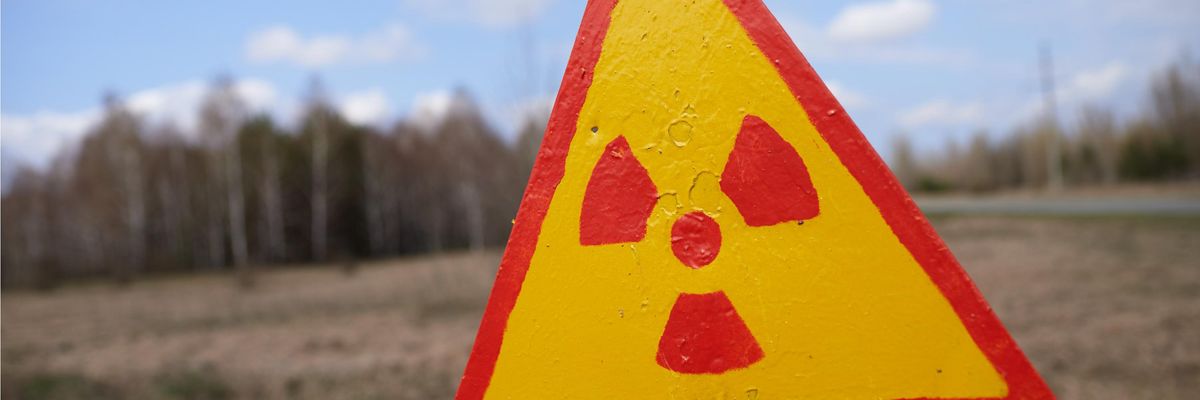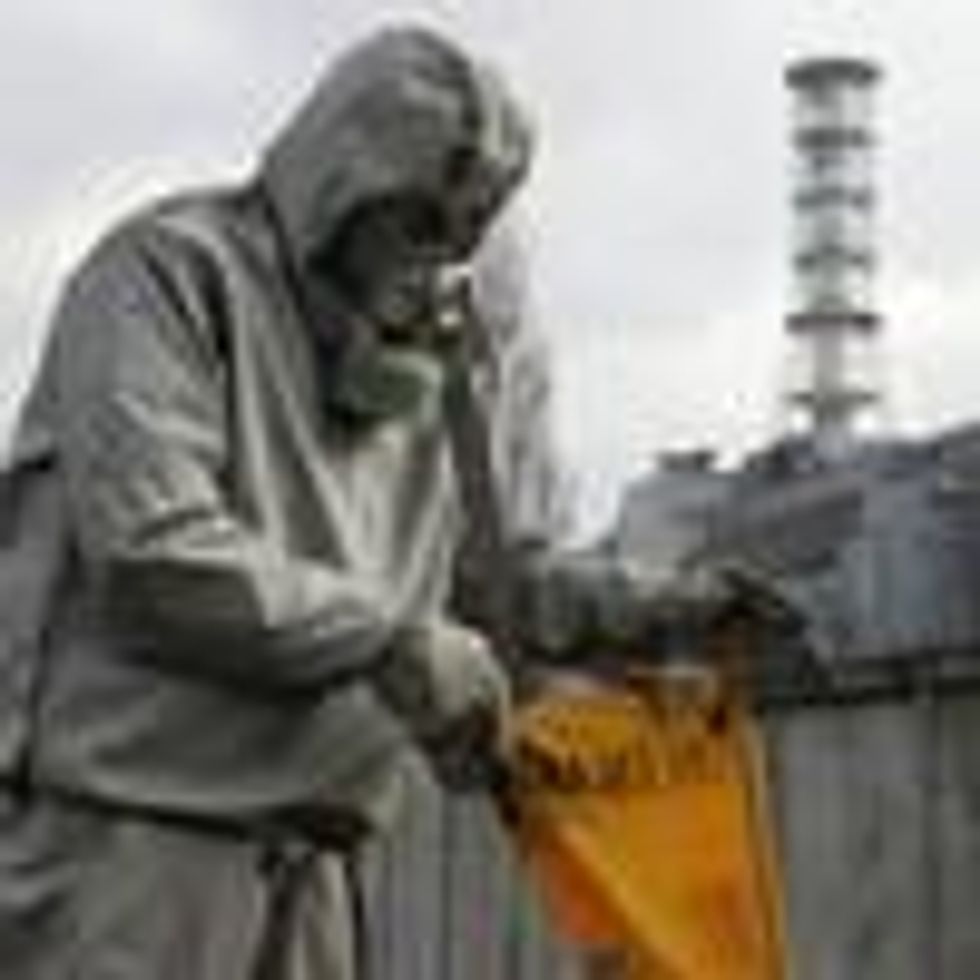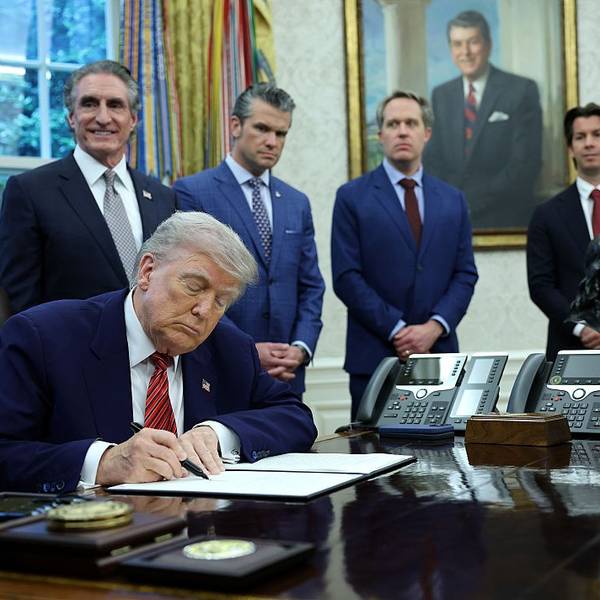
A sign warning of radioactive danger is seen in front of the "Red Forest" near the Chernobyl Nuclear Power Plant within the Chernobyl Exclusion Zone on April 7, 2016. (Photo: Vitaliy Holovin/Corbis via Getty images)
Amid Reports of Radiation Sickness, IAEA Says Russia Has Withdrawn From Chernobyl
"The convoy kicked up a big column of dust," Chernobyl workers said of the Russian military. "Many radiation safety sensors showed exceeded levels."
The International Atomic Energy Agency said Thursday that Russian forces have almost entirely left the site of the former Chernobyl nuclear power plant in northern Ukraine, where officials said they were exposed to "significant doses" of radiation since taking over the site in late February.
The BBC reported that some soldiers are being treated in Belarus for radiation sickness, which can cause a range of symptoms depending on the level of exposure including nausea, vomiting, skin damage, and seizures or coma in extreme cases.
According to Energoatom, the Ukrainian state nuclear company, the troops "panicked at the first sign of illness," which "showed up very quickly."
The agency reported that Russian soldiers dug trenches in the "Red Forest," which surrounds the former Chernobyl power plant that was the site of the worst nuclear disaster in history in 1986. The forest has the most radioactive contamination of any part of the Chernobyl Exclusion Zone, a 1,000-square-mile area that was closed to the public after the accident, and was called the Red Forest after pine trees in the area turned red due to radiation absorption.
The former power plant is still staffed by workers, some of whom reported to Reuters earlier this week that they have been concerned about the Russians disturbing radioactive material since the troops took over the site.
"When they were asked if they knew about the 1986 catastrophe... they did not have a clue. They had no idea what kind of a facility they were at."
One employee told the outlet the Russian military's actions were "suicidal," referring to troops who drove armored vehicles through the Red Forest and disturbed radioactive dust without radiation protection, likely causing internal radiation exposure as they inhaled the dust.
"The convoy kicked up a big column of dust. Many radiation safety sensors showed exceeded levels," a worker told Reuters on Tuesday.
The Ukrainian state agency that manages the Exclusion Zone lost control of its radiation monitoring system shortly after the Russians seized Chernobyl, but said on February 27 that the last record its sensors had shown that the absorbed dose of radiation at the site was seven times higher than normal following the takeover.
Chernobyl workers have been held hostage at the site for several weeks, during which they observed that the Russian troops, including specialists trained to work with radioactive material, did not use protective gear.
The troops reportedly were not aware that they were in a radioactive area, according to Reuters.
"When they were asked if they knew about the 1986 catastrophe," the workers told the news outlet, "they did not have a clue. They had no idea what kind of a facility they were at."
Reports that Russian soldiers have now left the site with radiation sickness follow numerous earlier reports that Russian President Vladimir Putin's military had been unprepared for its assault on Ukraine. Earlier this month, U.S. intelligence showed that "poorly trained and ill-prepared" young Russian conscripts were surrendering in large numbers or sabotaging their vehicles to avoid combat.
"Russia's ruthless treatment of its own soldiers, while concealable at a small scale, has now brought about operational repercussions," Jack Watling of the Royal United Services Institute for Defence and Security Studies wrote earlier this month at The Guardian.
Related Content

Ukraine Officials Warn Chernobyl Radiation Levels 'Exceeded'
As the soldiers left Chernobyl Thursday, some scientists expressed concern for animals that have lived in the Exclusion Zone since the 1986 disaster.
"Lots of rare species moved in when people moved out," Prof. Nick Beresford told the BBC. "We just don't know how this will have affected the wildlife."
The Russians' attacks on other nuclear sites, including Europe's largest nuclear power plant in Zaporizhzhia, southeastern Ukraine, have also raised alarm in recent weeks.
Troops shelled a cooling unit at the plant in early March in order to take control of the site.
"They intentionally shelled it with tanks. That was craziness," Ukrainian energy minister German Galushchenko told the Washington Post Thursday. "We came very close to a disaster. The first unit of the plant was hit. It was on fire. It shows what they are willing to do."
An Urgent Message From Our Co-Founder
Dear Common Dreams reader, The U.S. is on a fast track to authoritarianism like nothing I've ever seen. Meanwhile, corporate news outlets are utterly capitulating to Trump, twisting their coverage to avoid drawing his ire while lining up to stuff cash in his pockets. That's why I believe that Common Dreams is doing the best and most consequential reporting that we've ever done. Our small but mighty team is a progressive reporting powerhouse, covering the news every day that the corporate media never will. Our mission has always been simple: To inform. To inspire. And to ignite change for the common good. Now here's the key piece that I want all our readers to understand: None of this would be possible without your financial support. That's not just some fundraising cliche. It's the absolute and literal truth. We don't accept corporate advertising and never will. We don't have a paywall because we don't think people should be blocked from critical news based on their ability to pay. Everything we do is funded by the donations of readers like you. Will you donate now to help power the nonprofit, independent reporting of Common Dreams? Thank you for being a vital member of our community. Together, we can keep independent journalism alive when it’s needed most. - Craig Brown, Co-founder |
The International Atomic Energy Agency said Thursday that Russian forces have almost entirely left the site of the former Chernobyl nuclear power plant in northern Ukraine, where officials said they were exposed to "significant doses" of radiation since taking over the site in late February.
The BBC reported that some soldiers are being treated in Belarus for radiation sickness, which can cause a range of symptoms depending on the level of exposure including nausea, vomiting, skin damage, and seizures or coma in extreme cases.
According to Energoatom, the Ukrainian state nuclear company, the troops "panicked at the first sign of illness," which "showed up very quickly."
The agency reported that Russian soldiers dug trenches in the "Red Forest," which surrounds the former Chernobyl power plant that was the site of the worst nuclear disaster in history in 1986. The forest has the most radioactive contamination of any part of the Chernobyl Exclusion Zone, a 1,000-square-mile area that was closed to the public after the accident, and was called the Red Forest after pine trees in the area turned red due to radiation absorption.
The former power plant is still staffed by workers, some of whom reported to Reuters earlier this week that they have been concerned about the Russians disturbing radioactive material since the troops took over the site.
"When they were asked if they knew about the 1986 catastrophe... they did not have a clue. They had no idea what kind of a facility they were at."
One employee told the outlet the Russian military's actions were "suicidal," referring to troops who drove armored vehicles through the Red Forest and disturbed radioactive dust without radiation protection, likely causing internal radiation exposure as they inhaled the dust.
"The convoy kicked up a big column of dust. Many radiation safety sensors showed exceeded levels," a worker told Reuters on Tuesday.
The Ukrainian state agency that manages the Exclusion Zone lost control of its radiation monitoring system shortly after the Russians seized Chernobyl, but said on February 27 that the last record its sensors had shown that the absorbed dose of radiation at the site was seven times higher than normal following the takeover.
Chernobyl workers have been held hostage at the site for several weeks, during which they observed that the Russian troops, including specialists trained to work with radioactive material, did not use protective gear.
The troops reportedly were not aware that they were in a radioactive area, according to Reuters.
"When they were asked if they knew about the 1986 catastrophe," the workers told the news outlet, "they did not have a clue. They had no idea what kind of a facility they were at."
Reports that Russian soldiers have now left the site with radiation sickness follow numerous earlier reports that Russian President Vladimir Putin's military had been unprepared for its assault on Ukraine. Earlier this month, U.S. intelligence showed that "poorly trained and ill-prepared" young Russian conscripts were surrendering in large numbers or sabotaging their vehicles to avoid combat.
"Russia's ruthless treatment of its own soldiers, while concealable at a small scale, has now brought about operational repercussions," Jack Watling of the Royal United Services Institute for Defence and Security Studies wrote earlier this month at The Guardian.
Related Content

Ukraine Officials Warn Chernobyl Radiation Levels 'Exceeded'
As the soldiers left Chernobyl Thursday, some scientists expressed concern for animals that have lived in the Exclusion Zone since the 1986 disaster.
"Lots of rare species moved in when people moved out," Prof. Nick Beresford told the BBC. "We just don't know how this will have affected the wildlife."
The Russians' attacks on other nuclear sites, including Europe's largest nuclear power plant in Zaporizhzhia, southeastern Ukraine, have also raised alarm in recent weeks.
Troops shelled a cooling unit at the plant in early March in order to take control of the site.
"They intentionally shelled it with tanks. That was craziness," Ukrainian energy minister German Galushchenko told the Washington Post Thursday. "We came very close to a disaster. The first unit of the plant was hit. It was on fire. It shows what they are willing to do."
The International Atomic Energy Agency said Thursday that Russian forces have almost entirely left the site of the former Chernobyl nuclear power plant in northern Ukraine, where officials said they were exposed to "significant doses" of radiation since taking over the site in late February.
The BBC reported that some soldiers are being treated in Belarus for radiation sickness, which can cause a range of symptoms depending on the level of exposure including nausea, vomiting, skin damage, and seizures or coma in extreme cases.
According to Energoatom, the Ukrainian state nuclear company, the troops "panicked at the first sign of illness," which "showed up very quickly."
The agency reported that Russian soldiers dug trenches in the "Red Forest," which surrounds the former Chernobyl power plant that was the site of the worst nuclear disaster in history in 1986. The forest has the most radioactive contamination of any part of the Chernobyl Exclusion Zone, a 1,000-square-mile area that was closed to the public after the accident, and was called the Red Forest after pine trees in the area turned red due to radiation absorption.
The former power plant is still staffed by workers, some of whom reported to Reuters earlier this week that they have been concerned about the Russians disturbing radioactive material since the troops took over the site.
"When they were asked if they knew about the 1986 catastrophe... they did not have a clue. They had no idea what kind of a facility they were at."
One employee told the outlet the Russian military's actions were "suicidal," referring to troops who drove armored vehicles through the Red Forest and disturbed radioactive dust without radiation protection, likely causing internal radiation exposure as they inhaled the dust.
"The convoy kicked up a big column of dust. Many radiation safety sensors showed exceeded levels," a worker told Reuters on Tuesday.
The Ukrainian state agency that manages the Exclusion Zone lost control of its radiation monitoring system shortly after the Russians seized Chernobyl, but said on February 27 that the last record its sensors had shown that the absorbed dose of radiation at the site was seven times higher than normal following the takeover.
Chernobyl workers have been held hostage at the site for several weeks, during which they observed that the Russian troops, including specialists trained to work with radioactive material, did not use protective gear.
The troops reportedly were not aware that they were in a radioactive area, according to Reuters.
"When they were asked if they knew about the 1986 catastrophe," the workers told the news outlet, "they did not have a clue. They had no idea what kind of a facility they were at."
Reports that Russian soldiers have now left the site with radiation sickness follow numerous earlier reports that Russian President Vladimir Putin's military had been unprepared for its assault on Ukraine. Earlier this month, U.S. intelligence showed that "poorly trained and ill-prepared" young Russian conscripts were surrendering in large numbers or sabotaging their vehicles to avoid combat.
"Russia's ruthless treatment of its own soldiers, while concealable at a small scale, has now brought about operational repercussions," Jack Watling of the Royal United Services Institute for Defence and Security Studies wrote earlier this month at The Guardian.
Related Content

Ukraine Officials Warn Chernobyl Radiation Levels 'Exceeded'
As the soldiers left Chernobyl Thursday, some scientists expressed concern for animals that have lived in the Exclusion Zone since the 1986 disaster.
"Lots of rare species moved in when people moved out," Prof. Nick Beresford told the BBC. "We just don't know how this will have affected the wildlife."
The Russians' attacks on other nuclear sites, including Europe's largest nuclear power plant in Zaporizhzhia, southeastern Ukraine, have also raised alarm in recent weeks.
Troops shelled a cooling unit at the plant in early March in order to take control of the site.
"They intentionally shelled it with tanks. That was craziness," Ukrainian energy minister German Galushchenko told the Washington Post Thursday. "We came very close to a disaster. The first unit of the plant was hit. It was on fire. It shows what they are willing to do."

